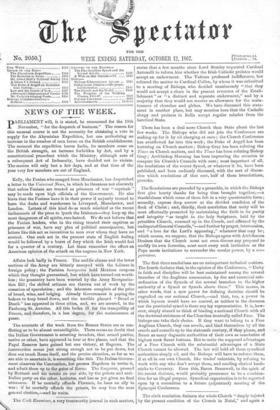The first three resolutions are on unimportant technical matters. The
fourth declares that, in the opinion of the Conference, "Unity in faith and discipline will be best maintained among the several branches of the Anglican communion, by due and canonical sub- ordination of the Synods of the several branches to the higher authority of a Synod or Synods above them." This means, in other words, that a new power for defining doctrine should be engrafted on our national Church,—and that, too, a power in which laymen would have no control, as neither in the diocesan nor the provincial synod is there any lay representative. It is, how- ever, simply absurd to think of binding a national Church with all the doctrinal strictness of the Churches ironically called Free. The bishops can take their choice. If they want to belong to a Free Anglican Church, they can secede, and bind themselves by all the creeds and councils up to the sixteenth century, if they please, and flaunt as many dogmatic authorities of their own as mandarins of highest rank flaunt buttons. But to unite the supposed advantages of a Free Church with the substantial advantages of a State Church cannot be allowed. The law will hold all these synodical authorities.simply nil, and the Bishops will have to enforce them, if at all in our own Church, like trades' unionists, by refusing to work with any who don't accept them, and sending clerical knob- sticks to Coventry. Even this, Baron Braswell, in the spirit of his recent decision, would probably pronounce to be a combina- tion for an illegal purpose. Synodical organization is to be reported upon by a committee to a future (adjourned) meeting of the Episcopal Conference.






























